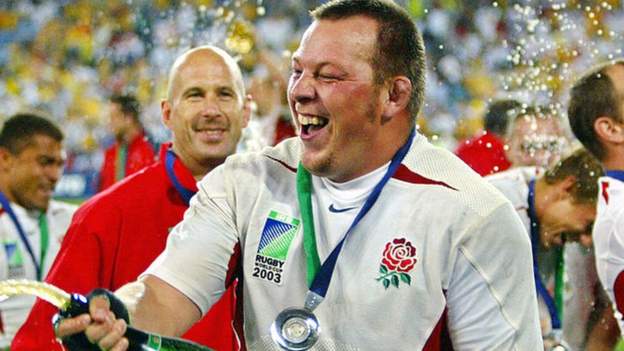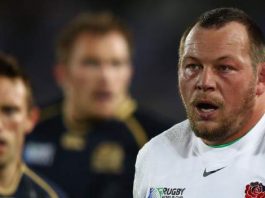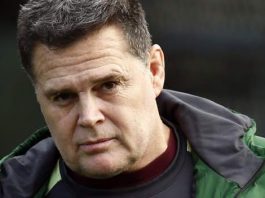| Watch Head on: Rugby, Dementia, and Me on BBC Two, Wednesday, October 5, at 21:00 GMT and later BBC iPlayer. |
Steve Thompson, the World Cup winner, has taken all of his medals and trophies. It is too difficult to keep his memories alive since he started to lose his memory.
He opens the box that contains his 2003 World Cup medal and MBE as well as photographs from Buckingham Palace. The ex-England international admits that he is embarrassed by the photos.
The 44-year old says, “I feel like an idiot.” It feels like I haven’t done it.
Thompson regrets it, and even more. He might not now have the early onset dementia that he believes was caused from his career of taking hundreds upon hundreds of blows on the head.
He says, “If I hadn’t done it I might not have been so burdensome on the family.”
All this is shown in a disturbing hour-long BBC Two movie that follows Thompson.
Another scene shows him trying to describe the “out of body” feeling he experiences from the brain fogs. He suddenly stops mid-sentence. It's quite illustrative.
We also witness him describing upsetting moments such as forgetting the names of his children or leaving his car running for hours.
Thompson has clearly seen the negative effects of dementia on his life. spoken previously About his suicidal thoughts.
He was part of a group that launched a legal action in 2020. sue rugby's governing bodies for negligence.
The film captures all of it – from Thompson's family struggling to accept his diagnosis to Thompson giving his voice to the fight for safer rugby.
After the release of the documentary, new research was published This study examines the relationship between sport, neurodegenerative diseases like Parkinson's, MND and dementia.
Professor Willie Stewart, a neuropathologist consultant, was the lead of the study. He suggested that rugby authorities consider removing contact training and reducing rather than expanding the global calendar.
“You were told to just get on with it.”
Thompson was diagnosed in 2020 as having early-onset dementia. This, he believes, is most likely due to a brain condition known as chronic traumatic encephalopathy.
According to him, “This degenerative disease is caused numerous head impacts, also known as subconcussions.”
Thompson is shown visiting Prof Steve Gentleman (a professor of neuropathology from Imperial College London) during the film. Prof Gentleman explains how CTE is a condition which worsens over time and for which there is no cure.
Thompson believes the root cause is the numerous head impacts he received as a player.
He was part the rugby professional generation in 1995. BBC Sport interviewed him about his experiences and said that he believed the protocols around full-contact training and concussion were unsafe. He describes doing 100 live scrums in a single training session.
He said, “If knocked out and you returned to, you were just told that you should continue on.”
“If you have headaches, you can just get headache pills. It wasn't considered an injury. It would be something like, “Attah you haven't pulled on your hamstring, so it's still possible to run.”
Thompson said that in certain contact situations, Thompson told players that their heads were their most powerful weapon.
He was a hooker and was at the forefront of the 16-man scrum. He says that the pressure on his head would have been “enormous”.
He says that he had a scrummage where the scrum-machine was tied into the ground to stop it moving.
“Rather than the machine moving just a little, the pressure is going all the way through your body. They then break off and go into rucks. The pressure just gets into your head.
“As you come off you pass out. They would give me a few moments to come back around and then repeat the process. Your blood vessels would burst around your eyes from all the pushing you did.
“You don't deserve to be here on this Earth,”
Thompson describes how he now experiences mood swings, depression, and forgetfulness.
There are moments in the film when he cannot remember the names of his children.
Steph, his wife, says that they have young children. “It's sad that you might not get to know them when they are teenagers.”
Thompson said to BBC Sport that he now requires more rest. He described his brain as “a really old Nokia telephone” and stated that it must be charged for at least 12 hours to get an hour of activity.
He also claims that he lost his job because of his condition.
“When I came to the surface and told people, how many people wanted my services? He says, “They're broken.”
“If you have been diagnosed with dementia and are working at a place where another person is injured, insurance companies will not pay.”
It's only when you are there that you can truly understand. You don't deserve to be here on earth and you don’t deserve to make others suffer.”
Thompson also shares the techniques that his therapist has taught Thompson to cope with difficult moments.
“I spray Steph’s perfume on my arms and stuff,” he said. “Certain photos on my smartphone – when I start feeling anxious, they pulls me back from it.”
“There are not many homes that will accept young men.”
Thompson is among more than 185 players The suit against the governing bodies of rugby union for negligence.
The film features him describing some of his negative reactions to the action, including being trolled in rugby circles.
He is also disappointed at the response of rugby authorities, including the Rugby Football Union (RFU), the game's governing body.
He claims that the RFU has not supported him. “Since I began the legal action, they have even stopped sending me the birthday cards I received every year.”
Thompson claims he deserves compensation in the event he requires specialist care.
“I don't want to see my children have to give up their lives in order to take care of me,” he said.
“If I have to go into a home, you're talking £10,000. It's rare for young men to be accepted into care homes.
“I did my job. I did my best to train as hard as I could. It is the job of other people to look after you.”
A little introduction to concussion protocol
Thompson is also seeking compensation. He wants rugby to be safer. This includes less contact training, longer rest periods for concussion players, and brain scans.
He asked: “In France they have heart scans. If players' hearts aren’t right, they can’t play. What's the difference between a brain and a heart?
In July 2021, MPs' inquiry Conclusion: Sport had been allowed “to mark its own homework” regarding reducing brain injury risks. The recommendation was for a standard definition and paid medical officer to be used at all major sporting events.
World Rugby was founded in September of last year. recommended Limit full contact training to 15 minutes per semaine
Thompson contrasts this with his playing career. He says that he would be training contact for about 10 hours per week.
He believes that it is not enough to make recommendations.
He said, “I'm happy they've finally done some, it feels a bit like a joke,” and added: “As it isn't a statutory ruling, only advisory, it can easily be ignored.”
This year's June, World Rugby extended its concussion stand-down period from six to 12 days.
Thompson believes the sport can go even further.
He says that while it's a start, “it's not enough to allow my children to play full contact rugby.”
World Rugby stated in a statement that it embraces innovation and technological advances to promote the prevention, identification and management of head impacts in rugby.
“This proactive commitment has resulted in advancements in laws of the game and revised guidance on contact train load. It also led to groundbreaking research using instrumented jawguards, and for former players, access brain health consultations and brain education.”
The RFU said that it had played “an instrumental role in establishing concussion injury surveillance, concussion evaluation, and supporting laws changes to ensure proactive management for player welfare”.
The statement continued: “We and Rugby Players' Association made contact with former players to share our work and do our best to help them, including the launch of an advanced brain clinic for retired players last year.”
Thompson played for the Northampton Saints where he spent most of his professional career. Thompson said that player welfare was always a priority. Concussion protocols have been implemented and followed in a timely manner… to ensure appropriate monitoring for and management of head injuries.”
Support and information are available for anyone who has been affected by the issues discussed in this article. BBC Action Line.


